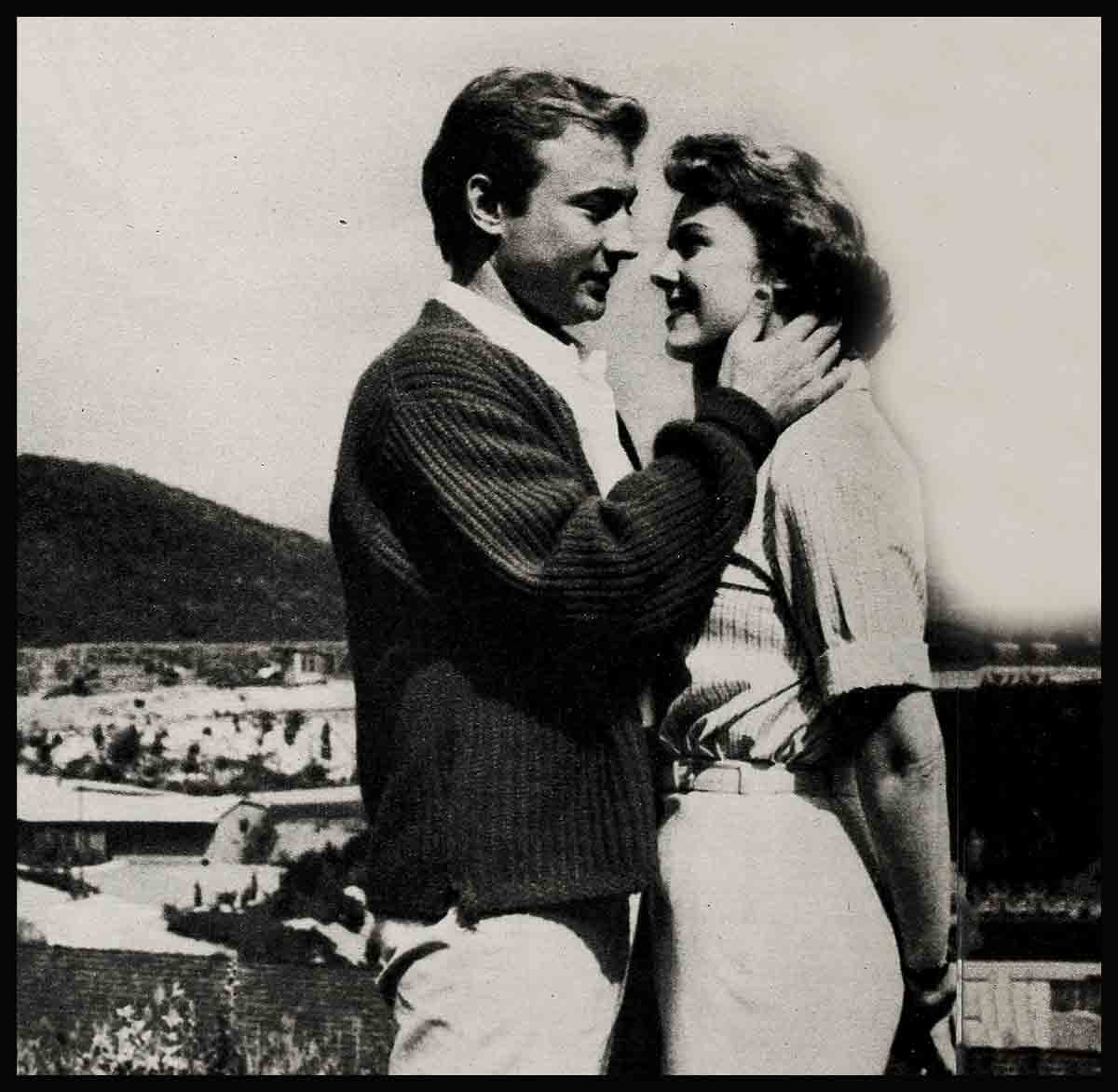
I Couldn’t Find A Girl In Hollywood . . . (but I found one in San Diego)—Nick Adams
The evening was balmy and clear. The moon shone brightly on the Pacific Ocean as the waves rolled lazily toward the shore. It was a spring night, made for lovers, and I was determined to make the most of it. . . .
Next to me in my open Thunderbird convertible was one of Hollywood’s loveliest and most promising young actresses. My arm was around her waist, her head nestled on my shoulder, her soft blonde hair caressed my cheeks. I bent over her and kissed her tenderly. I was in heaven.
“Nicky,” she said at last, “do you think I should really do it?”
I hesitated. “Do—what?”
“Accept that part I was telling you about. You remember—my agent called me this morning and asked if I had made up my mind and I told him that I couldn’t possibly. . . .”
That did it!
I started the engine, shifted in reverse, tore back a few feet, then swung back toward town.
“What’s the matter with you, Nicky?” “I don’t understand you. Are you mad at me or something?”
She didn’t understand. None of them did. I didn’t blame her any more than the other actresses I have taken out. Some new and aspiring, full of hope and ambitions. Others well established, with a big fan following all over the country. The rest someplace in between.
I have dated them; I have kissed them; I’ve been seriously in love with at least two. But it never worked out. I just couldn’t find a girl in Hollywood—at least not the kind I’d want to marry, to spend the rest of my life with, to be any wife and the mother of my children.
Preoccupation with their careers is just one of the many reasons. There are others, equally disadvantageous to what I would consider a happily-ever-after.
Opportunism is one of the worst. It comes in every form, shape and size—and is ever present in Hollywood.
I remember one girl I took out who made me think I was a pretty good guy while we had dinner at one of the better restaurants on the Strip. She seemed a little dubious when I suggested going to a party at a friend’s house afterwards, but her enthusiasm increased considerably when I informed her the fellow was one of the top directors in Hollywood.
She was still charming and full of attention to me at his house till a fellow joined us who told her he was a casting director for one of the major studios. I’d known him for a long time. He was no more a casting director than I’m head of Twentieth Century-Fox, but had caught a lot of fish with his gimmick the last three years. He was about to hook another one.
“Nicky, darling, will you get me another drink?” my date asked coyly.
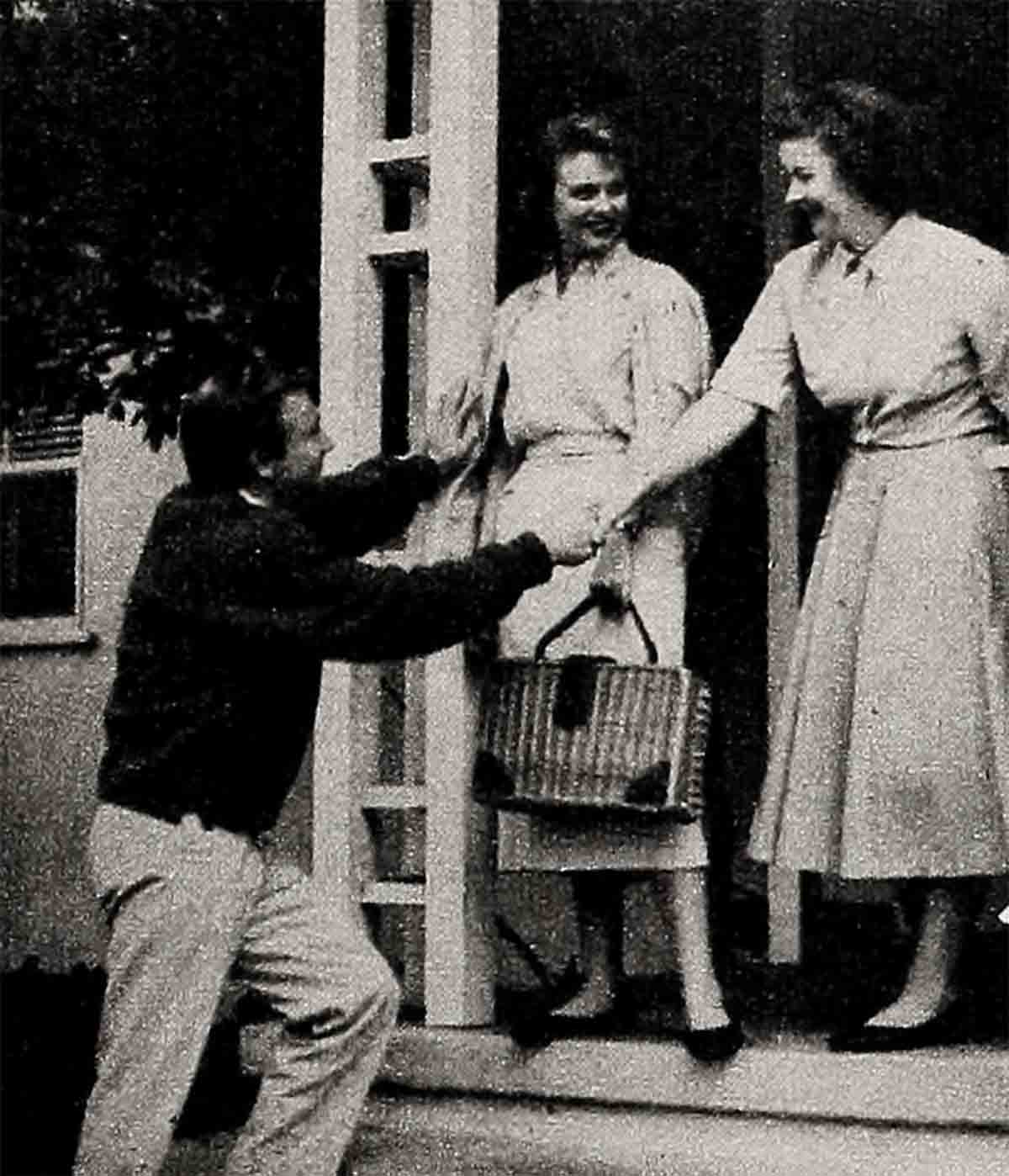
The brush
By the time I got back he was just jotting down her phone number, and with it killed most of her enthusiasm for me!
Usually I found the girls to be a little more subtle—but in the end most give themselves away nevertheless.
Just before Christmas I visited a friend of mine at NBC. With me was a young actress who had just finished her first lead in an inexpensive production.
When we walked into his dressing room he and a reporter were making a tape recording for a local radio station. A few minutes later my friend had to get back on stage for rehearsal, and I went along with him while my girl stayed behind with the reporter.
When I got back both looked overly innocent to me. They acted like they hadn’t said three words to one another. But when he left he turned to her and inadvertently let the secret slip out. “I’ll call you when we put the tape on the air . . .”
She didn’t realize he had given them away till he had closed the door. Then she turned red as a beet. “After all, Nick, he is from the press and he can be helpful. There’s nothing personal about it, honestly.”
I believed her, and that’s where part of the trouble comes in. There is nothing personal about it. There is nothing personal about most of the relationships between fellows and girls when both are in show business. It’s all so darn calculated.
Also, this business breeds the kind of phoniness that is hard to take. I’m not criticizing the girls for what they are, or trying to be, because I know that it is born of insecurity. They don’t believe people like them for whothey are, only for what they are, and I can well understand it for I have often felt the same way. At times I still do.
I remember a girl who had but a couple of small parts in minor pictures to her credit. Unable to impress me with her professional success, she tried to make up for it by constantly talking about her father’s wealth in Texas. Frankly, if anything, her old man’s fortune would have scared me away, but apparently she figured the opposite was true, because every few days she mentioned a letter about another oil well that had just come in.
If they were that wealthy, they certainly had odd tastes.
I happened to run into them one afternoon on their recent visit to Los Angeles. They were just parking their car near Sunset and Laurel Canyon—a 1946 Chevrolet. I’ve never seen a Texas millionaire drive a twelve-year-old car. A model T, maybe, but not a ’46 model!
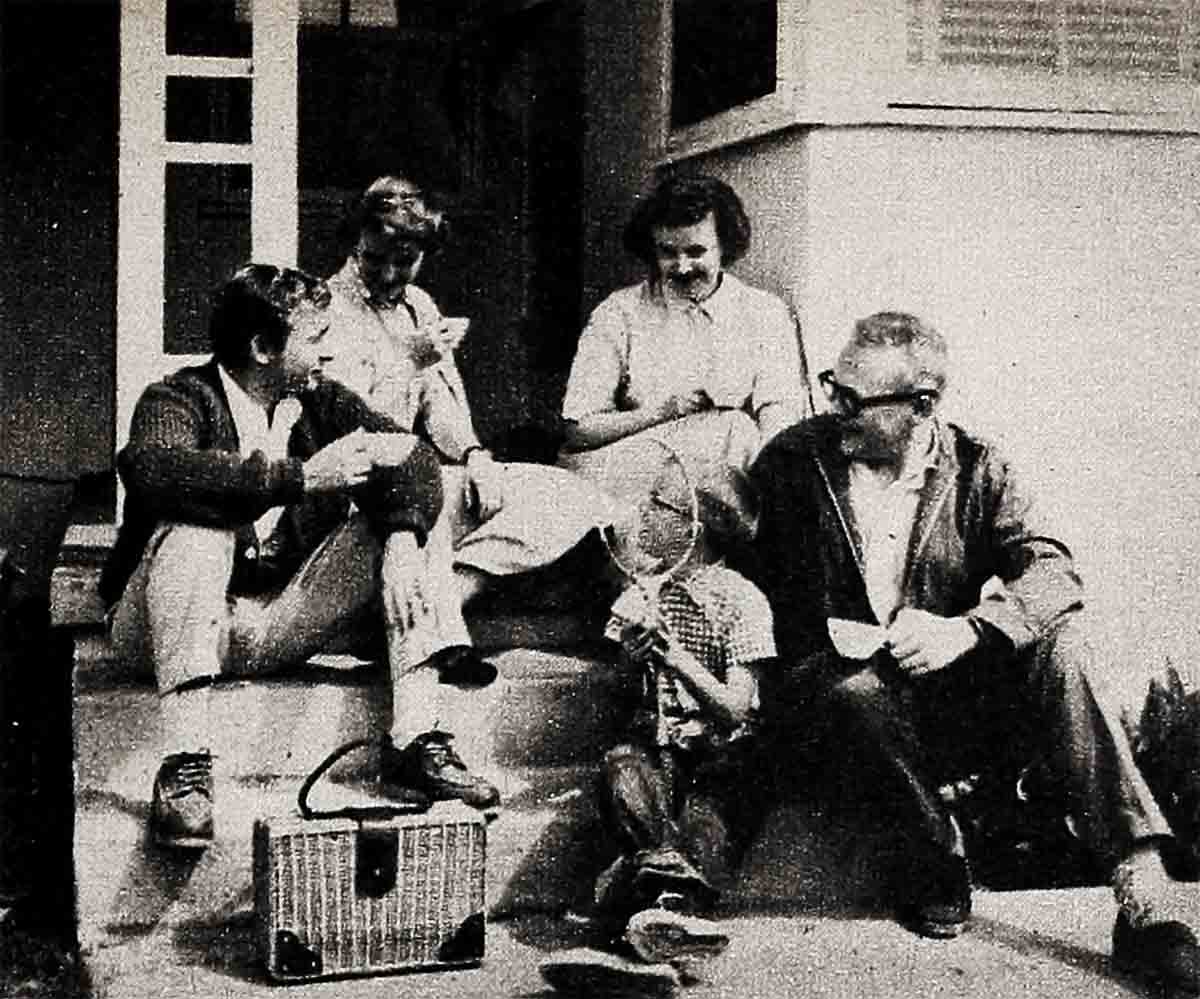
Who you?
And then there’s the opposite type, who’s going to show you from the very beginning that she isn’t impressed by you. And how she’s going to show you! I met such a character once again a week before I finished my latest Zane Grey Theater show. . . .
We were invited to the same party in the San Fernando Valley. She promptly informed me how she was interviewed that afternoon for one of the plum parts of the year, but modestly pretended she didn’t think she’d have much of a chance since she had only half a dozen TV shows to her credit, “all top parts, of course.” Finally she came around to asking what I was doing in Hollywood.
“I’m an actor,” I said irritably.
“Is that so?” she replied pleasantly. “Of course. Now don’t tell me—wait a minute—I’ll get your name. . . .”
No matter how hard she tried, she simply couldn’t remember. And when I told her it was Nick Adams and that I had been in more than a dozen films, she was equally convinced she couldn’t possibly have seen any of them because if she had, “I’d surely have remembered you.”
That she had seen me became quite evident a few minutes later when we were talking about Picnic, and she let it slip out how much she enjoyed the scene where Bill Holden bounced a basket ball off my head!
And then there’s the type who never notices you—till you’re successful.
When I first came to Hollywood I had quite a crush on a girl who moved into the studio club after she was signed to a term contract by one of the studios. Two or three times she let me buy her dinner, but generally treated me like a little boy. More nuisance than man and certainly no one to be taken seriously. After that, whenever I called her for a date she turned me down.
I didn’t blame her. Maybe I was just a fresh kid and if she preferred the Clark Gable type, who am I to put up a fight?
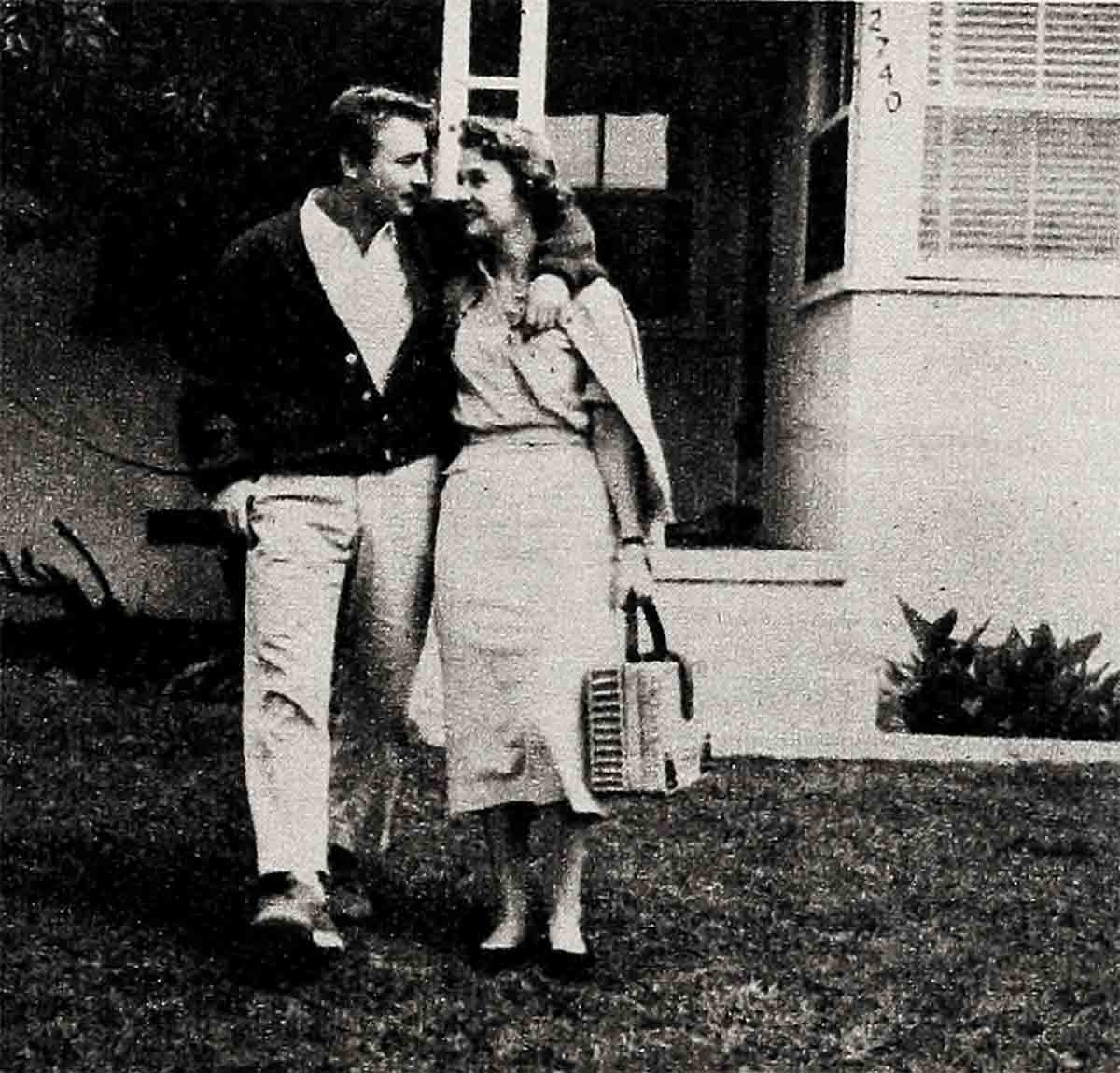
Oh, now I remember!
What did annoy me was a call I got the day after a local columnist wrote about seeing a sneak preview of No Time For Sergeants, which he predicted would establish me as one of the top comedy stars of the year.
I’m not saying this to give myself a pat on the back, nor am I modest enough to disclaim any credit. In fact, I love him for his opinion and hope more people will join the ranks—but that isn’t the point. The morning this girl read his notice she promptly called me up—I don’t have the faintest idea how she got my number that quickly—and told me how proud she was of me, and that she’d be delighted to have dinner with me that night.
I told her I was busy.
On the other hand, there is always an undercurrent that your own motives are misconstrued. And not necessarily by the people involved.
I first dated Natalie Wood, for instance, long before she attained her present prominence. Yet as she climbed in popularity, a lot of writers took cracks at me, called me a leech, an opportunist, a hanger-on. And everytime I dated another so-called name star, the same accusations started to fly around. First I got hurt, then I denied them, then tried to ignore them. But you can’t, completely. And so every time a reporter used to ask me, “And whom are you dating now, Nicky?”—I had the uneasy feeling that he was cynical about the whole thing—even if he wasn’t.
Thanks to some fortunate breaks in recent months I am now at the point where I can get my name into columns on my own, if I wish to do so, and no one is making cracks like this about me anymore. But I haven’t forgotten that time, and I don’t think I ever will.
And then there are the known facts and statistics with which I’m all too familiar: the percentage is against two people, both in show business, making a go of their marriage. I can’t see myself married to a girl who reads the movie columns—looking for her name in print—before kissing me good morning. Maybe I’m the jealous type—but I wouldn’t want my wife to make love to a handsome leading man before she comes home to fix my dinner. And heaven forbid if she gets to be a bigger name in the industry than I am! I want to be the boss in the family, and would lose my self-respect the first time someone called me Mr. whatever-my-wife’s-name-would-happen-to-be.
Nor do I want a wife who gets up at five in the morning and comes home at eight at night, so dead-tired she hardly recognizes me!
What do I want?
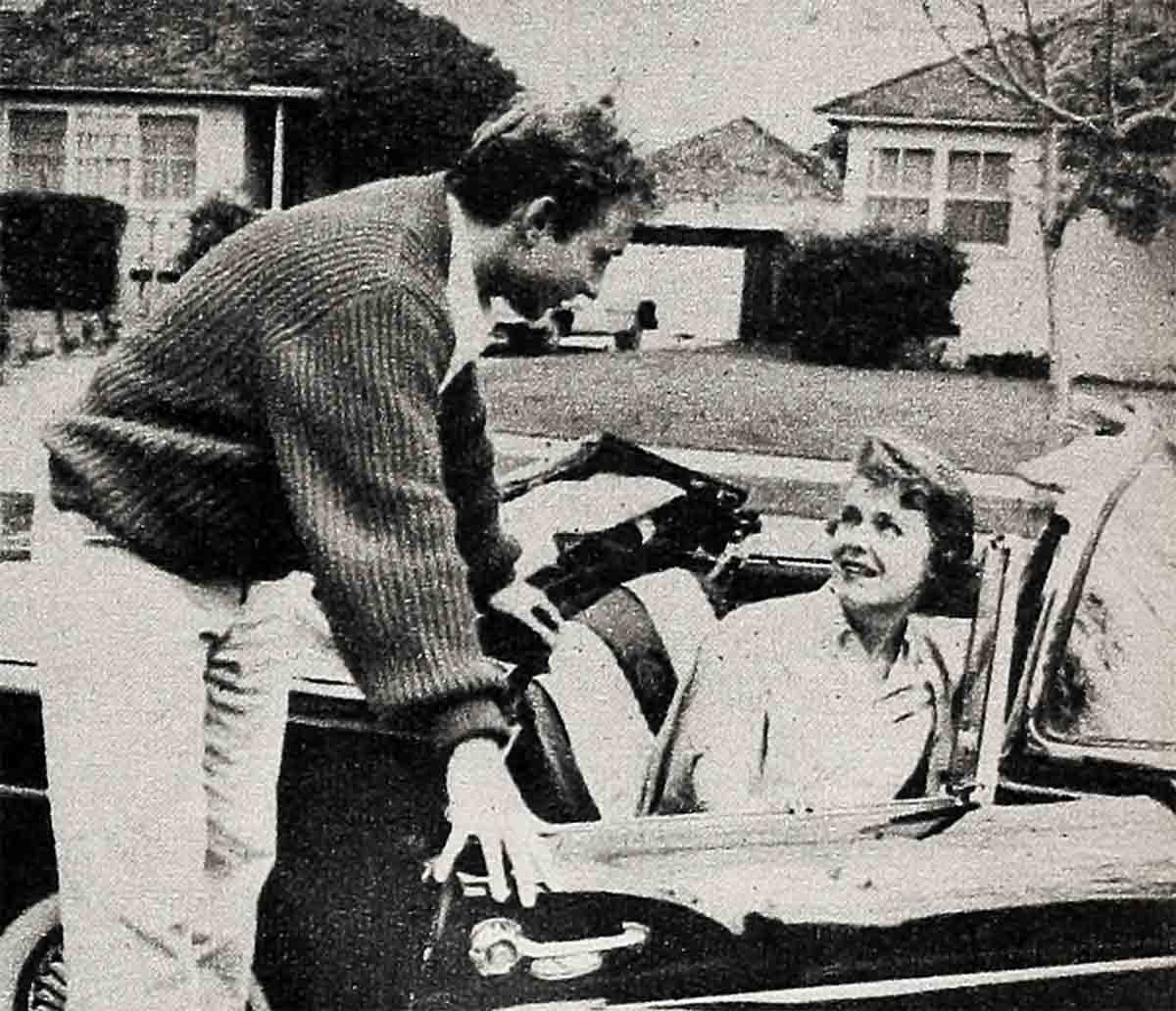
Qualifications
I want her to rest up for me all day and when I come home, slide down the bannister and rush into my arms to welcome me! I want her to have the hi-fi set on and the bathtub full of hot water and a martini with two onions mixed and chilled and ready to serve.
No Hollywood actress would ever fall into this category. But I did find a girl—20,000 feet up in the air!
I’m not saying that Lois Raymen and I are going to get married or that we’re engaged or that we’re even in love. Quite frankly, till the proper time comes for such an announcement, that’s my business. But I can tell you that she personifies all the qualities I like to see in a girl. And not the least of her assets is the fact that she lives not in Hollywood—but in San Diego!
We met about six months ago, when she was a United Airlines hostess on the New York-Los Angeles flight.
She was so attractive, so natural and so refreshingly honest I immediately fell for her.
“I saw you in The Last Wagon,” she told me when she finished serving the first round of drinks to the other passengers.
“You did? How’d you like it?”
“I thought you were cute.”
Cute! Of all the descriptions about the most dramatic part I’ve ever played! That was my first reaction. But then I couldn’t suppress a grin. At least she didn’t use show business terminology.
We talked for almost six of the eight hours in flight, which probably shortchanged some of the other passengers. But no one complained. Lois proved to be equally good at listening and talking.
Before we landed at International Airport I learned that she was born in Iowa, had been with United Airlines for a year and a half, was single, unattached, and hoped to get out of the airline service as soon as she could find a permanent job because, while she enjoyed flying, she preferred to settle down in one place. She also told me about a girl friend in San Diego who had a secretarial job lined up for her in a lawyer’s office, and that whenever she stopped over in Los Angeles—New York was her home base—she stayed with a young couple and their children in Westwood. And that she would be delighted to have dinner with me the following evening but that we would have to eat early because she was due out on the eleven p.m. flight back to New York.
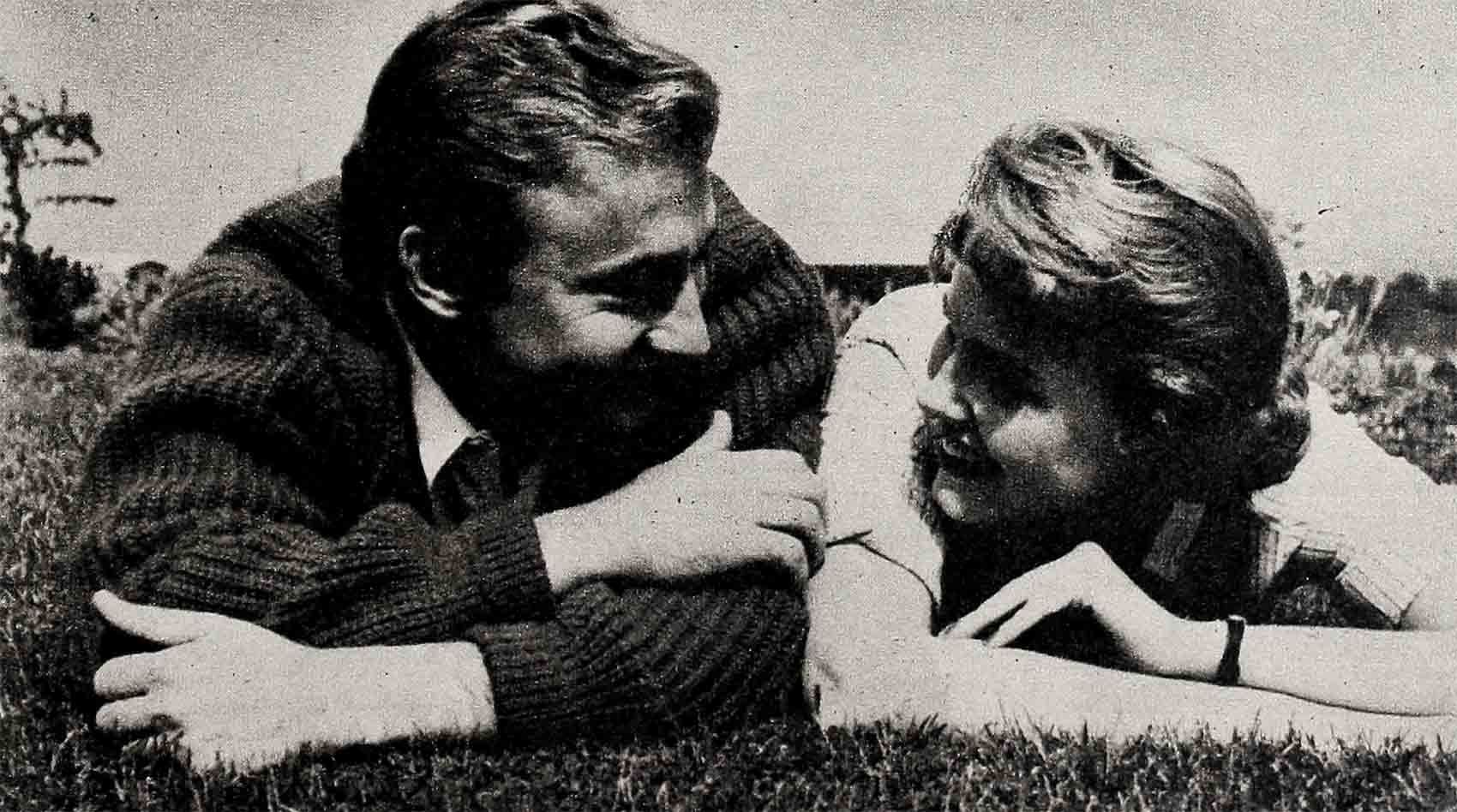
A different evening
When I brought her to the airport the following night, I tried to figure out what made this evening so different from so many others. Suddenly I realized that for the first time in years I had spent hours without talking about show business!
I saw her several more times before she quit her job with the airlines and moved to San Diego, to go to work for the lawyer. And always we had a good time together.
We didn’t consciously avoid discussing my work. We talked about it, just like her job, when it fitted into the conversation. But it didn’t become an issue from the moment we met till I kissed her good night.
We seldom go to expensive restaurants or night clubs; never to premieres. She loves Mexican food and, when I see her in San Diego, we usually cross the border into Tijuana to see the Jai Alai games and bull fights and spend money on a lot of silly little gifts for one another which we’ll never be able to use.
Lois is never too preoccupied to listen to my problems nor has any of her own which we can’t discuss and settle by talking about them, just the two of us. Not like a couple of girls I used to date.
I remember one in particular who always brought her problems to me but never gave me an opportunity to discuss mine. One night, in particular, I was quite concerned about a part, and wanted her opinion on it since she’d been in show business a lot longer than I. But when I picked her up at her house and saw her discouraged expression, I couldn’t bring myself to talk about me. Obviously something had gone wrong with her career.
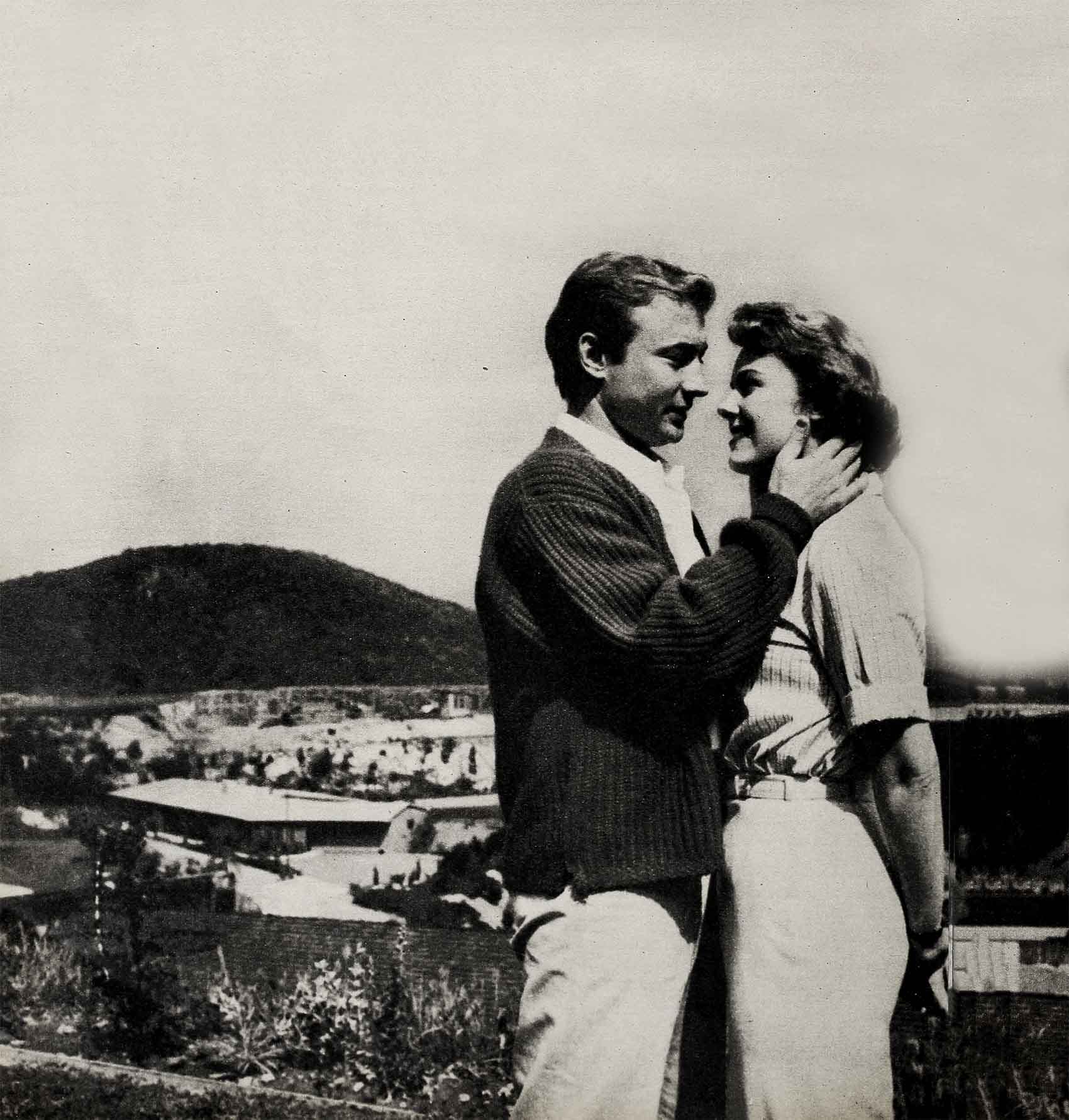
“Trouble at the studio?” I asked.
We spent the entire evening going over her problem; I never got to tell her mine.
I don’t think I’m so selfish that I have no compassion for other people’s worry. I do. And I’ll try to help as much as I can. But in this business, where crisis follows crisis, people can become so immersed in their own problems that they never have time for the other’s.
Just as important to me, Lois likes my friends because of the kind of people they are, and not because of their success or standing in the Hollywood community.
I remember a New Year’s Eve a couple of years ago, when I had two invitations—one to a famous producer’s house, the other to Aaron and Carolyn Spelling. Mrs. Spelling is actress Carolyn Jones, of course, but that was before Carolyn won acclaim for her performance in Bachelor Party and before Aaron became the successful screenplay writer he now is. Because they are among my closest friends, I wanted to go to the Spellings. But my girl was impressed by all the important people who were to be at the other party; her choice was the producer’s house.
The last time Lois came up from San Diego I promised to take her to one of Beverly Hills’ most expensive eating places for the first time. She was delighted. But when I picked her up at the Wicklands’ I suddenly remembered it was the birthday of a close friend—a policeman. “Do you mind if we get a bottle of chianti and some cold cuts and go to his house?”
“What a silly thing to ask, Nicky,” she came back. “I’d love it.”
When we got there she cooked the meal for them and then insisted on baby-sitting while I took my friend and his wife to a movie, since it was his birthday. In one evening she had brought more happiness into their lives than they’d had in months.
That’s what I like about Lois. That’s the kind of quality I want in a girl, a girl I’m going to be serious about.
Don’t misunderstand me. I’m not knocking Hollywood actresses. Some of my closest friends are in the business. Most of them, in fact. And I understand and appreciate their preoccupations, their ambitions, their insecurities, their concern. It’s part of the job.
I just don’t want to get married to a job. I want a wife!
THE END
—BY NICK ADAMS
Nicky’s in Paramount’s TEACHER’S PET and soon will appear in Warner’s NO TIME FOR SERGEANTS.
It is a quote. MODERN SCREEN MAGAZINE JUNE 1958




